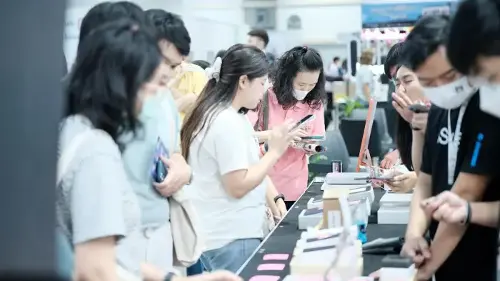
Despite the sluggish economy, the local smartphone market rebounded last year after two years of decline, according to global research firms IDC and Canalys.
IDC said the Thai market expanded by 17.1% to reach 16.9 million units shipped, while Canalys recorded 16.4 million units, growth of 7.1%.
This momentum is expected to continue in the first quarter of 2025, according to IDC.
"With the market rebounding strongly in 2024 following two consecutive years of decline, vendors should continue to pursue growth," said Apirat Ratanavichit, research analyst at IDC Thailand.
"Despite macroeconomic and political uncertainty, smartphone vendors and channel partners are looking at market opportunities arising from government stimulus programmes as well as increased affordability through financing plans," said Mr Apirat.
There was a 14% increase in shipment volume in the first half of 2024, with the growth increasing to 20% in the second half of the same year, according to IDC.
The entry-level smartphone segment priced less than US$200 increased to 56.9% of the market, up from 54.8% the year before.
The premium segment, priced more than $1,000, decreased to 9% of the market compared with 12% in 2023, noted IDC.
There was particularly strong growth in the ultra-low-end segment priced lower than $100, which rose from 11% to 14%, while the mid-to-high-end segment priced between $400 to below $800 rose 9.5% to 12.8%.
The average selling price of the total market was $336, falling 7.5% in 2024.
The share of 5G smartphones increased to 45.6%, up from 43.2% in 2023, driven by the lower starting price and wider availability of affordable 5G Android models, as well as an increasing consumer appetite for 5G mobile phones.
According to IDC, Oppo, Samsung and Apple were the top three brands with 19.4%, 19.2% and 15.9% market shares respectively, followed by Xiaomi (14.7%) and Vivo (12.3%).
Mr Apirat told the Bangkok Post the Thai smartphone market experienced strong growth in recent quarters and he expects that momentum to continue into the first quarter this year.
Vendors are increasingly introducing more affordably priced, feature-rich smartphones, including lower-cost 5G devices, while the higher-end segments benefit from broader promotion and the wider availability and adoption of financing plans, he said.
"We anticipate healthy smartphone demand in the near term, partially offsetting the decline observed in 2023," said Mr Apirat.
"The primary beneficiaries of the Easy E-Receipt programme will be smartphones in the mid-range segment and above [priced more than 10,000 baht], which will drive first-quarter growth."
Regarding the illegal loan apps pre-installed on Oppo and Realme phones, he declined to comment because it is too early to assess the impact.
The two Chinese brands quickly axed the apps and said new phones would no longer include them.
Canalys analyst Sheng Win Chow told the Bangkok Post the local smartphone market grew 7.1% last year to post 16.4 million units.
In the fourth quarter of 2024, Oppo had a 17% market share, Apple 17%, Vivo 15%, Samsung 14% and Xiaomi 13%.
Canalys' latest research revealed Southeast Asia's smartphone market rebounded in 2024, with vendors shipping 96.7 million units, up 11% year-on-year after two years of decline.
Oppo led the regional market for the first time, capturing an 18% share with 16.9 million shipments, marking a 14% annual increase. Samsung followed with 16.6 million units and a 17% market share.
Transsion and Xiaomi both secured 16% of the market, while Vivo rounded out the top five with a 13% share.
